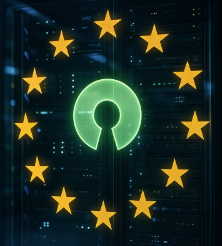Europe’s digital infrastructure has become a critical pillar of our modern society. From power grids and hospitals to administrative and communication systems, our daily lives depend on technologies whose vulnerabilities are increasingly the focus of political and economic attention. Cyberattacks on these infrastructures are on the rise, and Europe's reliance on non-European providers presents a serious strategic risk. To build long-term resilience, we need more than just new technologies – we need a fundamental shift in how we think about and implement security.
Understanding the importance of open software is crucial to achieving this goal. The open-source model fosters transparency, traceability, and collective security. Open systems allow full code inspection, continuous improvement, and fast responses to vulnerabilities, especially in critical situations. They also enable digital sovereignty by reducing dependence on foreign influence – a central argument for Europe’s autonomy in cybersecurity. Open Source Software (OSS) is verifiable, auditable, and enables trust through transparency.
If open source offers such advantages in terms of security, why is it still so challenging to build successful business models around it? This is the core dilemma we must address. Open source is not just a technical foundation – it is also a strategic economic model. Today, most modern software infrastructure already relies on open-source components. Cybersecurity companies – particularly startups – that embrace openness from the beginning have a unique opportunity: to build solutions that are both socially relevant and economically scalable. OSS-based cybersecurity is emerging as a cornerstone for protecting European infrastructure.
However, freely available open-source code – often published in the form of “community editions” – is not by itself sufficient for enterprise use. Professional markets demand solutions that meet the highest standards of quality, reliability, and support. This is where specialised companies come in: they build on open foundations and deliver secure, enterprise-ready products. These companies are often the most active and vital contributors to their respective OSS projects. They perform quality assurance, produce stable enterprise releases, and pursue formal certifications. Their commercial offerings include professional support, legal accountability, and service-level guarantees – all essential for enterprises to adopt OSS solutions with confidence.
It’s time for the market – and the venture capital sector – to recognise this shift and actively support it. Until now, open solutions have been largely sustained by public funding, foundations, or volunteer communities. But to ensure greater digital autonomy for Europe, market forces must also be directed toward building and professionalising open-source ecosystems. Investing in open security solutions is not an act of philanthropy – it is a forward-thinking business decision. Open source is becoming a strategic success model for European cybersecurity companies. As open European solutions gain traction and collaboration worldwide, their global impact is expected to grow significantly.
Take a look as well to Serena Report
About the author and his team:
With ESCRA, a new standard for secure, sovereign IT infrastructure is emerging – open source, zero trust, AI-powered. This young team from Saarland blends academic excellence with hands-on innovation to create solutions that not only follow the curve but set it. For all those who combine security with confidence and sovereignty.
If you would like more information or would like to exchange ideas, please contact the author directly:
joerg.audoersch@escra.de
www.escra.de



Comments
Do you want to leave a comment?
Login or register to proceed
Login Register